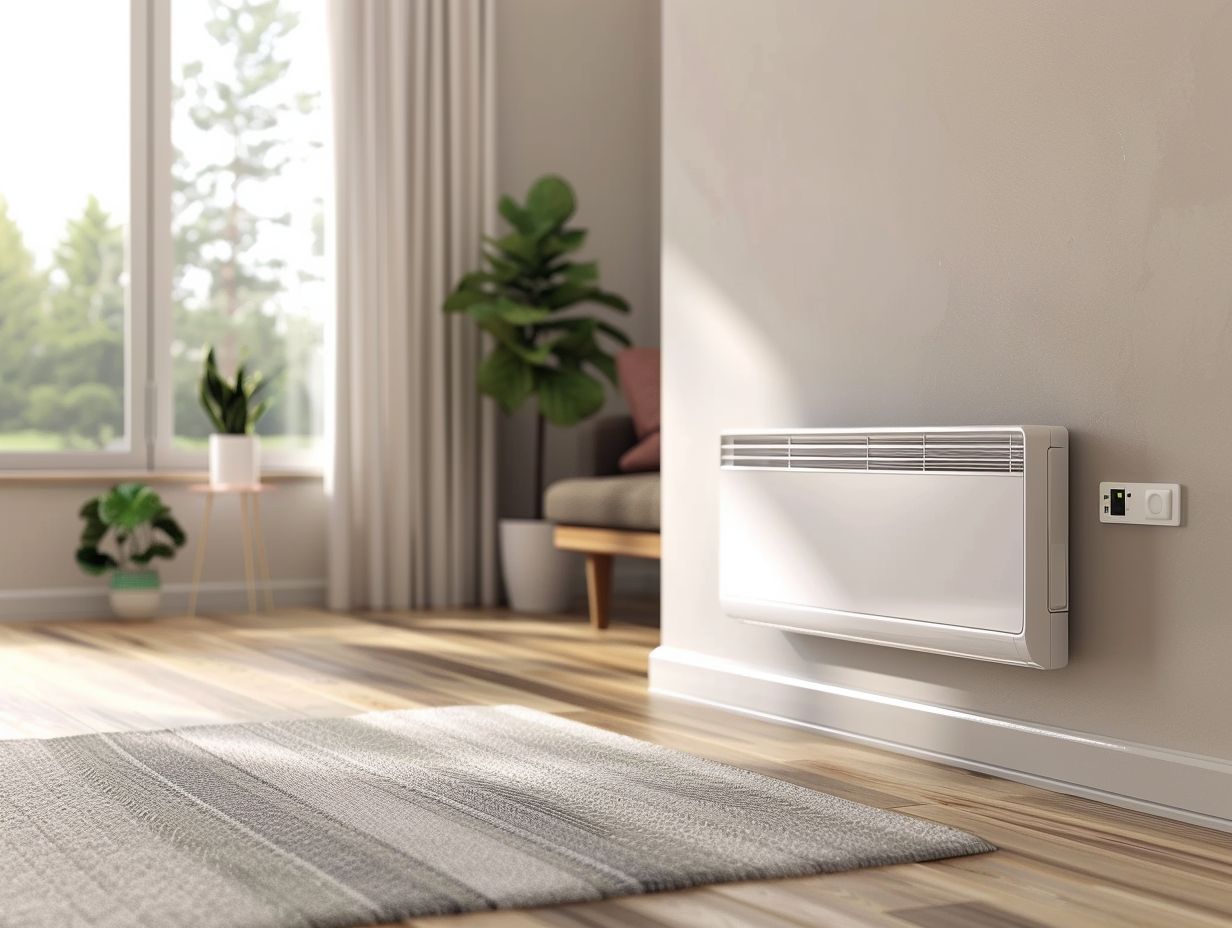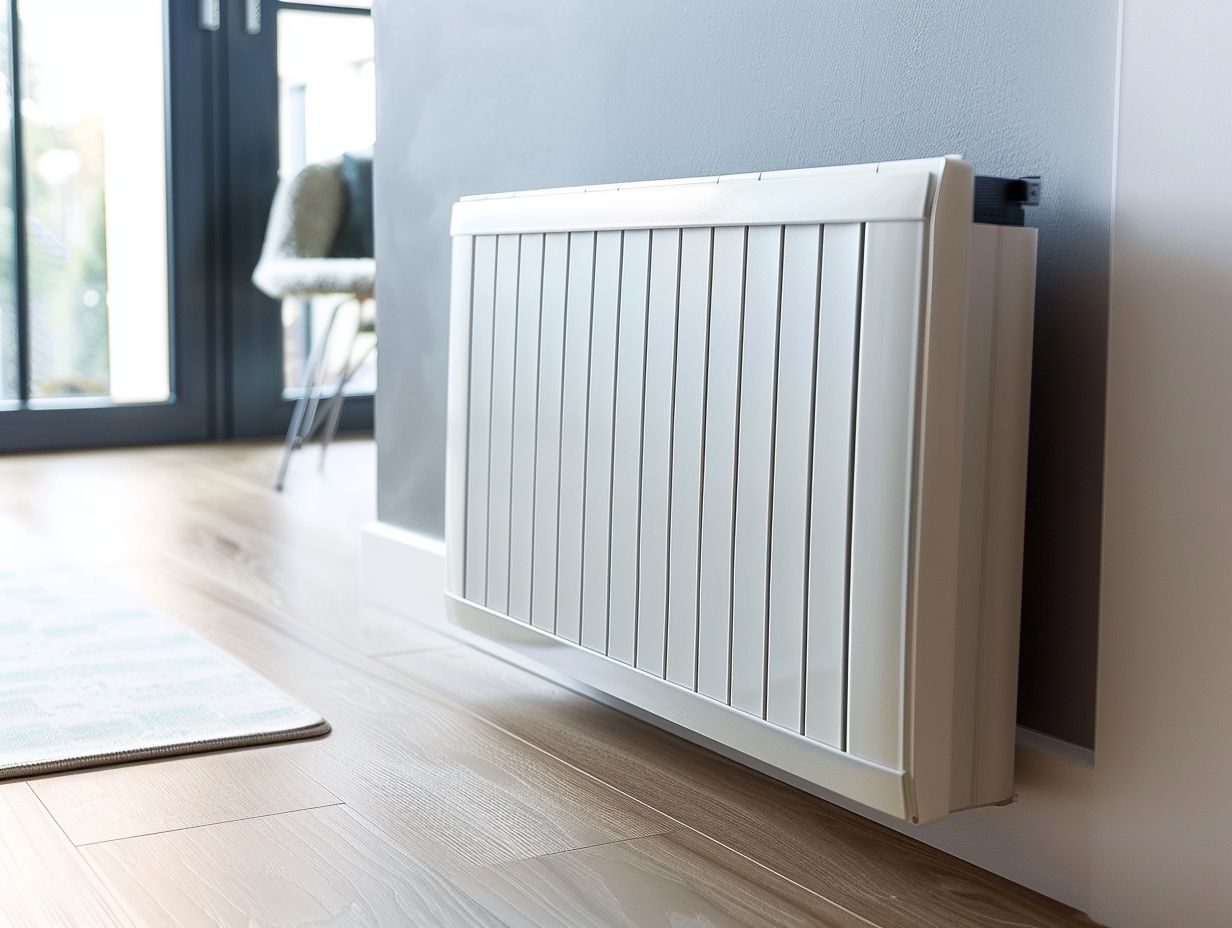If you are considering investing in a new heating system, you may be faced with the decision of choosing between central heating and electric heating.
To make an informed choice, it is essential to delve into a comprehensive comparison of these two prevalent options. This comparison will entail an examination of the operational mechanisms, components, as well as the efficiency, cost implications, and environmental footprint associated with both central and electric heating systems.
By the conclusion of this exploration, you will possess the necessary knowledge to select the most suitable heating system for your residential property.
Key Takeaways:

- Central heating is a more complex system that requires a boiler, pipes, and radiators, while electric heating is simpler and easier to install.
- Electric heating may be more cost-efficient for smaller spaces, but central heating is more effective and cost-efficient for larger homes.
- When choosing between central heating and electric heating, consider factors such as upfront cost, energy efficiency, and environmental impact to determine the best option for your needs.
Overview of Central and Electric Heating
When considering efficient and sustainable heating solutions, homeowners often turn to central and electric heating systems. Central heating relies on a system of radiators and pipes to distribute heat produced by a central boiler or heat pump throughout the entire house, ensuring consistent warmth in every room.
On the other hand, electric heating systems use electrical resistance to generate heat, providing a convenient and adjustable option for maintaining desired temperatures. Both central and electric heating systems offer the benefit of being relatively straightforward to install compared to other heating methods, leading to potential cost savings for homeowners.
These systems can be easily integrated with heat pumps to further improve their energy efficiency and eco-friendliness, making them appealing choices for individuals prioritising sustainability in their heating projects.
How Central Heating Works?
Central heating operates by producing heat in a central location, typically a boiler or heat pump, and then distributing it through a network of pipes to radiators in various rooms of your house. The heat level can be regulated with a thermostat to ensure that each room achieves the desired temperature.
Components and Mechanics
The components of a central heating system typically include a central boiler or heat pump, radiators in each room, a network of pipes to distribute hot water or steam, and a thermostat for temperature regulation.
The operation of the system involves heating the air using the radiators and then circulating it throughout the house to ensure a comfortable indoor climate.
Radiators play a critical role in this system by releasing heat into the room. The size and heat output of radiators are determined through British Thermal Unit (BTU) calculations, which consider factors like room size and insulation levels. Properly sized radiators are essential for efficient heat dispersion and creating a warm environment.
When choosing radiators, it is important to factor in the design, material, and BTU rating to align with the specific heating needs of each room. Understanding the BTU requirements for different spaces can help optimise energy usage and maintain consistent warmth throughout the entire house.
How Electric Heating Works?

Electric heating functions by converting electricity into heat energy using electric models like the Livingstone range of radiators. These electric radiators act as the main heat source and are regulated to uphold ideal room temperatures.
Types of Electric Heating
When considering electric heating options, you have a range of choices available. Electric radiators are available in various designs, allowing you to choose one that complements your room decor.
Additionally, underfloor heating systems offer efficient heat distribution throughout the room. The heat output of these electric heating systems can be adjusted to suit the specific requirements of each room.
Electric radiators are known for their versatility, seamlessly fitting into both modern and traditional spaces. With sleek finishes and customisable colours, they are not only functional but also aesthetically pleasing. On the other hand, underfloor heating provides a luxurious heating solution that ensures even warmth throughout the room, eliminating any cold spots.
When making decisions about electric heating options, it is essential to consider not only the heat output needed for the room but also the design elements that will contribute to the overall ambiance of the space.
Efficiency and Cost Comparison
In evaluating the efficiency and cost of heating systems, it is crucial to consider the running costs over time. Electric heating systems are recognised for their efficiency but may incur higher running expenses in comparison to gas heating, largely due to electricity prices. Additionally, the installation costs are a key factor in determining the overall cost-effectiveness of each system.
Energy Efficiency and Cost Analysis
When selecting a heating system, you must consider energy efficiency and cost analysis as key factors. Electric heating systems offer precise temperature control, enhancing energy efficiency in your property. Introducing a heat pump system can further improve efficiency while providing sustainable heating solutions.
This level of control is achieved through several advanced control mechanisms, including programmable thermostats and zoning capabilities. These features enable users to customise heating requirements for specific zones within their property.
Heat pump systems are recognised for their capacity to extract heat from the air or ground, making them highly efficient and environmentally friendly.
By incorporating heat pump technology into heating projects, individuals can significantly reduce their carbon footprint and contribute to a greener future.
Environmental Impact

When considering the environmental impact of heating systems, it is imperative to address their role in climate change mitigation.
Choosing electric heating systems that are powered by renewable energy sources can effectively decrease carbon dioxide emissions and help cultivate a low-carbon footprint. This proactive approach plays a vital role in fostering a more sustainable environment for future generations.
Comparison of Carbon Footprint
When comparing the carbon footprint of heating systems, it becomes evident that there is a distinct environmental impact between gas boilers and heat pumps.
Gas heating systems are associated with higher carbon dioxide emissions, while heat pumps present a more sustainable alternative with reduced environmental impact.
Gas boilers are notorious for emitting substantial amounts of carbon dioxide into the atmosphere during the combustion of natural gas for heating purposes. This greenhouse gas is a significant contributor to climate change and global warming.
Conversely, heat pumps utilise electricity to extract heat from the air, ground, or water, thereby establishing themselves as a cleaner and more energy-efficient alternative.
Opting for heat pumps instead of gas boilers can lead to a significant reduction in households’ carbon footprint and contribute towards the collective effort in combating climate change.
Choosing the Right Heating System
When selecting the right heating system, you need to evaluate your specific heating needs and preferences. It is essential to consider factors such as the type of heating required, the importance of thermostat control, and the involvement of professionals like gas safety engineers for safe and efficient heating installations.
Factors to Consider
When considering a heating system, you should take into account factors like room size, the benefits of different systems, and contingency plans for power outages. Seeking advice from heating specialists in St Albans can offer tailored insights to meet your heating requirements.
It is crucial to evaluate the size of each room in your residence to determine the necessary heating capacity for effective heat distribution. For example, smaller rooms may benefit from radiant heating systems because of their targeted heat output, while larger areas may require a central heating unit for comprehensive coverage.
Understanding the unique advantages of electric, gas, or solar heating systems can assist you in making an informed decision based on factors like energy efficiency, maintenance costs, and environmental impact.
Having a contingency plan for power failures, such as installing a generator or using portable heaters, is essential to ensure uninterrupted comfort during unforeseen interruptions.
Frequently Asked Questions

What is the difference between central heating and electric heating (radiators)?
Central heating uses a boiler or furnace to heat water or air, which is then distributed throughout a building through pipes or ducts. Electric heating, on the other hand, uses electricity to directly heat individual radiators or panels.
Which type of heating is more energy-efficient?
Central heating is generally more energy-efficient than electric heating. This is because central heating can use a variety of fuel sources, such as gas or oil, which are typically cheaper than electricity.
What are the benefits of central heating?
Central heating provides consistent and even heating throughout a building, making it more comfortable for occupants. It also allows for the use of a programmable thermostat, which can help save on energy costs.
What are the benefits of electric heating (radiators)?
Electric heating can be more cost-effective for smaller spaces or individual rooms, as there is no need for a central system and it is easy to install. It also allows for zoned heating, meaning you can control the temperature in specific areas.
Which type of heating is more expensive to install?
Central heating systems typically have a higher upfront cost for installation, as it involves setting up a boiler or furnace, pipes, and vents throughout the entire building. Electric heating, on the other hand, only requires the installation of individual radiators or panels.
What factors should I consider when choosing between central heating and electric heating (radiators)?
Some factors to consider include the size of your space, your budget, and the availability of fuel sources in your area. It’s also important to consider the long-term costs and energy efficiency of each option.

